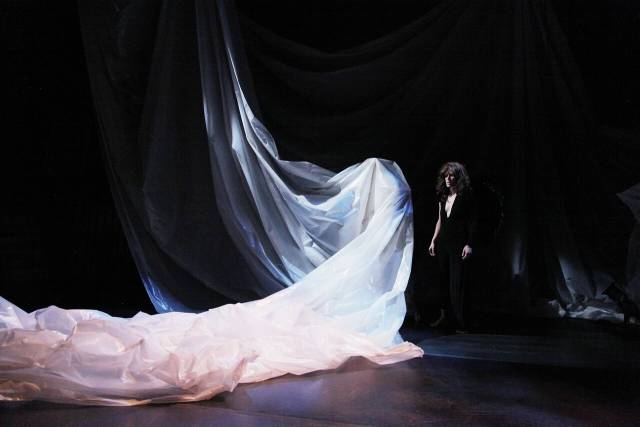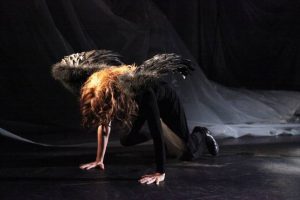

As a writer, performer, and director, Winsome Brown wears a lot of hats, which works out well for her current piece, Hit the Body Alarm, a one-woman show that weaves together four stories. Bringing Paradise Lost to modern theater by showing Eve and Satan’s stories alongside the struggles of an actress and a prison inmate, Hit the Body Alarm examines what it means to screw up on a grand scale, to make a decision that irrevocably changes your life for the worse.
The multi-talented Winsome Brown took some time out of her busy schedule week to let us behind-the-scenes of her thought process as writer and star of Hit the Body Alarm.
So tell me a bit about Hit the Body Alarm!
Hit the Body Alarm is what came out of my working on Paradise Lost, which is a project that I’ve been working on for quite some time, and a poem that I deeply love. I worked on it over years, really, and I began to refine what, to me, were the most potent and powerful moments of that great epic. They’re really about loss, and radical change of status. When Satan falls from Heaven to Hell, when Eve bites the apple. Those were moments that affected me the most.
I began to work on those moments, and to think about how I could tell the story of that kind of change in a way that spoke to our time today. It seemed obvious to me that the analogy of prison and being jailed, when you go from being a free individual to somebody who’s locked up, seemed very apt.
My friend and co-director in this play, Brad Rouse, had written a monologue for me called Hit the Body Alarm, a very potent and powerful piece about a federal lockup facility in Brooklyn. It seemed to resonate so powerfully with Paradise Lost, and I thought it made a very perfect segway from Satan’s hell into our modern hell. The second was a monologue I wrote called Elaine, about an actress who, through a very wrong series of logic, ends up committing a very violent act. That was the second piece that seemed to work very well with the notion of Eve and the eating of the apple.
In all of these pieces, people – or epic beings – have changed their status by their own act. So they’ve really fucked up, and somehow that touches me so deeply. So it’s about irrevocable loss and transformation. These four pieces work together, and although they’re four different stories, I find that they’re all of a piece.
The play is woven together by a magnificent soundscape designed by Sean Hagerty, with music by John Zorn, the incredible New York composer. Sound plays a big part in the play.

The play is about decisions. With the election coming up, it feels like very purposeful timing. Was that intentional?
It wasn’t that I pre-planned it. The idea that we as a nation and as a world are on the brink of potentially fucking up really royally is central in my mind, and I think in the minds of many people. In addition to our own election, I feel like the issues of the world and the environment are over us in a way that perhaps we’re not appreciating the fact that it could change, it could all change so radically, and suddenly all the things that we completely take for granted will be gone for us. Satan in fact says, in a line from Hit the Body Alarm, he looks at Adam and Eve sleeping and he says, “You little think how nigh your change approaches, when all these delights will vanish.” I wonder - are we on the edge of having all our delights vanish?
That’s a great line, and a little chilling to think about.
I certainly feel sort of politically charged right now, but the play doesn’t make any overt references to that. It’s certainly a motivating factor for me, and in how I’m thinking about things.
As a concept, the show is very different from your last show, This is Mary Brown, which was based on your mom. What’s it been like going from something so personal to you, to something more public and even a little politically charged?
This is Mary Brown was a very important piece of work for me that changed the way I work. I think it was a very important learning experience, because doing something that personal made it absolutely impossible to bullshit, and there was something so freeing in that. It can’t be other than what it is, because I know what it is. And so in a way it’s not so much about the change from one to the other, it’s the change in me. Ideally everything is just as personal, even though the story isn’t autobiographical, as it was with This is Mary Brown. That idea of stripping away artifice has stuck with me, so I think that I’ve been changed.
How do you apply the idea of stripping away artifice to an interpretation of Paradise Lost?
It’s still coming. I think the show will grow over my two weeks at the Performing Garage. With Eve, there’s some obvious stripping away of artifice because Eve is naked onstage. So I stripped away my clothing! But of course I should say that Eve is not naked, that’s absolutely essential. She happens to have no clothes on, but she’s not naked in any sense of that consciousness of shame.
But, it’s finding those characters in myself. Finding Satan in myself, finding myself in Eve. Finding, even in that heightened language, the directness of the communication. Satan speaks plainly. He uses beautiful language, but it’s clear, quite direct. And same with Eve. She speaks conversationally. So it’s easy to find myself in those characters. That’s how I’m trying to strip away the artifice.
It sounds like it has already been and will continue to be, quite wonderful!
I hope so! We opened last night, and we have eleven more performances to go at the Performing Garage. I had some people last night say ‘I’ve never seen anything like this before,’ and that’s kind of exciting! I’m conscious that it’s not perhaps that common of a structure, but the piece exists as a piece in my mind because my mind is holding it together. I feel that way about this work, and about the human condition as well. It is large and, as Walt Whitman says, it contains multitudes.
September 20 through Oct 2 at the Performing Garage.